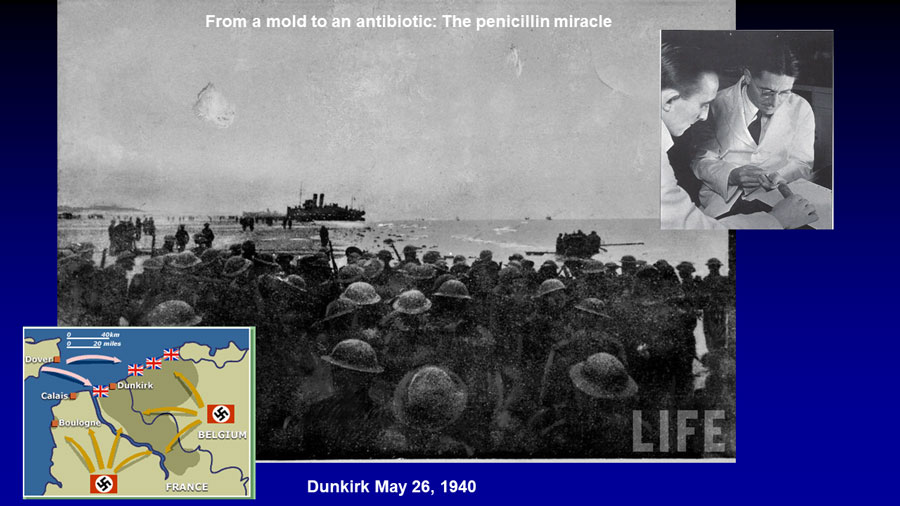History of Medicine elective course begins Jan. 8

In its ninth-year presentation, the elective course “Reflections Based on the History of Medicine” will be presented in a virtual format accessible to any member of the McGovern Medical School community beginning Jan. 8. The course, which provides knowledge and perspectives of the history of contemporary medicine is dictated by a distinguished group of professors of medicine including L. Maximilian Buja, MD; Eugene Boisaubin, MD; Joshua Samuels, MD; and its founder and director Adan Rios, MD.
The 12-lecture course begins at noon on Jan. 8 with a discussion of Charles Darwin and the Theory of Evolution and includes among other subjects the history of the scientific method using William Harvey’s discovery of circulation as a starting point, the development of contemporary microbiology with the lives of Pasteur and Koch, the discovery of the molecules of life with particular emphasis on the life of Rosalind Franklin, and the role of physics in medicine, the history of pandemics, and culminating with the life of Dr. Jonas Salk, on of the first giants of contemporary medicine.
“Lacking a historical perspective takes away from medical professionals having context for the ideas and concepts introduced to them throughout their curriculum, like where they came from and what are the principles that have gotten them to where they are now as professionals,” Rios said.
Rios said he aims to highlight different aspects of what medicine is as a profession to provide a foundation for better understanding how others in the past have contributed to different fields of medical development.
“I know that because of the constraints of time, we don’t need to go back to prehistoric times as that’s too remote from our daily life, but learning about the scientific method for example is important,” Rios said. “It’s worth it to know where we came from and how we, as physicians, came to the conclusion that this is the way we want to practice science.”
The 2025 History of Medicine course offers a diverse and international flavor with participation of medical schools and programs outside of UTHealth Houston such as The University of Texas MD Anderson Cancer Center, and from other countries like Costa Rica, Brazil, Spain, and Panama.
To register for the course, contact Rios at [email protected]. Each lecture sbegins at noon on its respective day and will be held virtually. Those desiring academic credit will be required to attend seven out of 12 lectures and provide an evaluation of each one to receive credit. The course schedule and description of each lecture are as follows:
January 08-Dr. Adan Rios
The Evolution Theory: Does it matter to medicine?
This lecture will bring forward a contemporary view of the Theory of Evolution within the framing of the practice of medicine and how its application can profoundly impact its practice.
January 22-Dr. Adan Rios
William Harvey and Critical Thinking
A discussion of the Scientific Method using William Harvey’s discovery of circulation as a base for it. The discussion also includes a historical reflection on the concept of Critical Thinking.
January 29-Dr. Adan Rios
Pasteur, Koch, and the building of the Panama Canal
This lecture takes us from the development of the Germ Theory, to “pasteurization,” to anthrax, and rabies vaccines culminating with the work of Dr. William Gorgas during the building of the Panama Canal.
February 05-Dr. Eugene Boisaubin
The role of the Civil War in the development of contemporary surgery
This lecture is a panoramic view of how Civil War surgery influenced the contemporary practice of medicine and in particular surgery.
February 12- Dr. Adan Rios
From a mold to an antibiotic: The penicillin miracle
Wrapped in popular mythology, the true story of how the penicillin miracle happened is alluring and fascinating.
February 26- Dr. L. Maximilian Buja
The history of contemporary cardiovascular surgery
Drawing from accounts obtained from primary sources, this is a glass through which we can see the seeds of today’s cardiovascular surgery and develop an appreciation for a past that lives in the present.
March 05- Dr. Joseph Samuels
The history of renal dialysis
The history of renal dialysis offers a panoramic view of how dialysis and renal transplants have changed the practice of medicine and the enormous impact this has had on the transplantation of organs.
March 12- Dr. Adan Rios
The molecules of life: DNA, physics, and the birth of molecular biology
This lecture discusses the impact of the discovery of DNA and its evolving applications in contemporary medicine. A must for anyone involved in health care.
March 26- Dr. Adan Rios
The Institutional Review Board (IRB): The genesis of the protection of human subjects from unethical experimentation
This lecture describes how IRBs came to be and how, despite some of the flaws that have accompanied their creation, have become important regulatory bodies for the advancement of clinical research.
April 09- Dr. Adan Rios
Pandemics: Back to the future
“There have been as many plagues as wars in history, yet plagues and wars always take us by surprise.” – Albert Camus in The Plague
This reflection by the Nobel Literature Prize winner accurately sums up the past and present times.
April 16- Dr. Adan Rios
From Democritus to Newton to Einstein to Planck: How physics continues to transform the practice of medicine
Physics is mostly known for giving man the capacity for ultimate destruction. Nonetheless, many benefits in medicine have come from an understanding of physics laws and principles. An overview of the physics world imbibed with hope for the future.
April 23- Dr. Adan Rios
Splendid Solution: Jonas Salk and the polio vaccine
The archetypal life of Jonas Salk will be used to illustrate, in one individual, the summation of many of the sweeping themes that make medicine one of the greatest professions in the history of mankind.